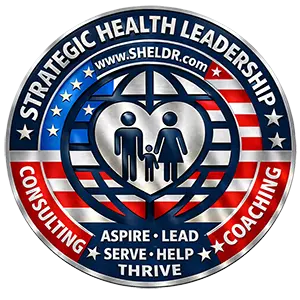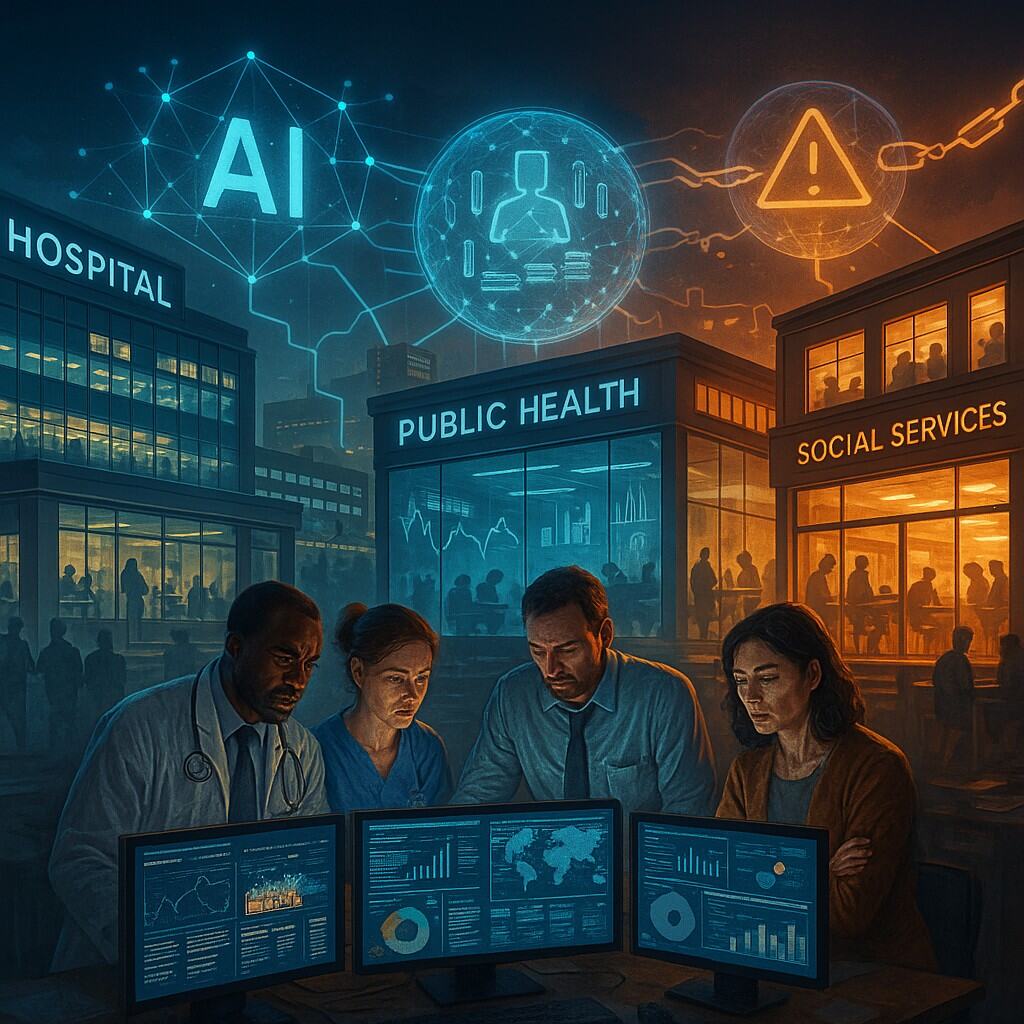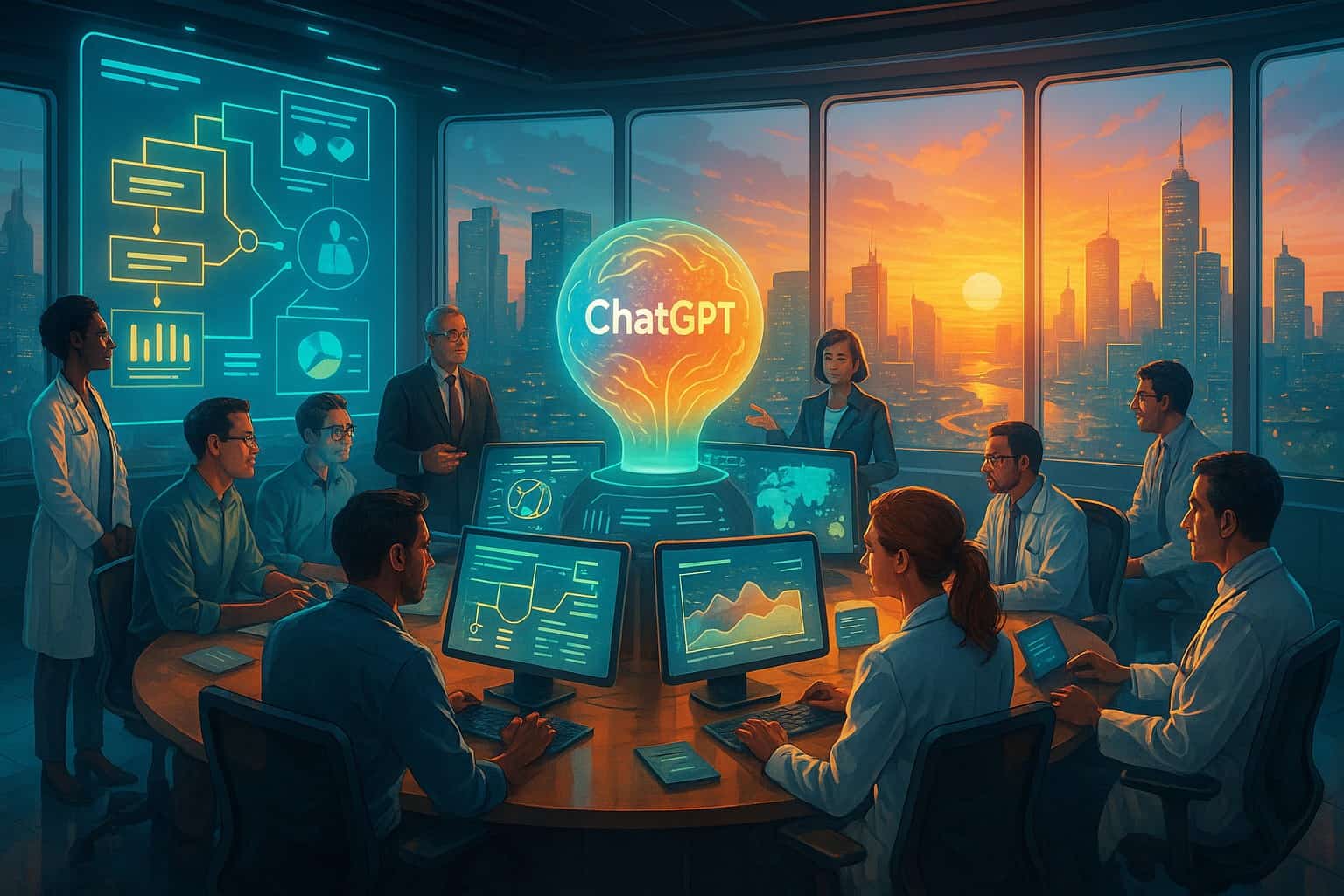Blip-Zip Executive Summary
Healthcare leaders face immense pressure to deliver quality care, reduce costs, and stay ahead of a rapidly evolving industry. Artificial intelligence (AI) offers a powerful solution, unlocking transformative opportunities in five key areas: data-driven decisions, optimized operations, personalized leadership development, predictive trend analysis, and workforce reskilling. This 3-part series embarks on a journey exploring how YOU, your team, and your organization can leverage AI at all levels to unlock success and improve the lives of those you serve.
Blip-Zip Takeaways
- AI is a game-changer: Leverage data analytics, operational efficiency, and personalized leadership development to boost your impact.
- See the future, shape the present: Use AI to predict trends and proactively adapt your strategies.
- Invest in yourself and team: Reskill yourself and your workforce to thrive alongside AI and future-proof your organization.
Top 5 Keywords
Healthcare leadership, Artificial intelligence (AI), Patient care, Operational efficiency, Leadership development
Table of Contents
Introduction to Leveraging AI As an Aspiring Health Leader
Healthcare executives are increasingly leveraging AI to empower their leadership skills and drive meaningful changes in the healthcare sector. AI’s applications in healthcare are vast and continue to evolve, offering substantial opportunities for leaders to enhance their decision-making and overall effectiveness.
Before You Continue, Ask the Right Questions To Fuel Your AI Journey
Remember, successful AI adoption starts with introspection. In my previous article, “Asking the Right Questions (ATRQ),” we explored crucial questions to guide your organization’s AI journey. Take a moment to reflect on these questions individually and engage in open discussions with your team:

- Current AI Utilization: How does your organization currently leverage AI to enhance patient care or social services and outcomes?
- Optimizing Operations: Have you explored AI-driven tools for streamlining operations and boosting efficiency? If so, which areas have seen improvements? If not, what’s the plan?
- Personalized Leadership Development: How can we personalize leadership development for healthcare leaders, and how can AI contribute to this process?
- Predictive Trend Analysis: Are you actively monitoring and analyzing industry trends through AI? How do these insights influence your strategic decisions?
- Workforce Reskilling: What initiatives are in place to reskill your healthcare workforce in response to AI adoption? How will you ensure your teams are prepared for the evolving landscape?
Why Embrace AI and AI-Powered Tools
As a health leader, your decisions directly impact patient lives, staff well-being, and organizational success. The rapidly evolving healthcare landscape demands you stay ahead of the curve, and AI is your key weapon. Here’s why:
- Unleash the Power of Data: Imagine making decisions based not on hunches but on in-depth insights gleaned from vast datasets. AI-powered analytics empower you to identify at-risk patients, personalize care plans, and optimize resource allocation – all leading to better outcomes and happier patients.
- Boost Efficiency and Cut Costs: Eliminate administrative burdens and optimize operations with AI. Imagine AI streamlining staff scheduling, predicting equipment needs, and automating repetitive tasks. This frees up your valuable time and resources, allowing you to focus on strategic initiatives and cost reduction.
- Drive Personal Growth and Lead by Example: Forget stagnant leadership development. AI tools like ChatGPT, Bard, and Copilot become your personalized coaches, analyzing your strengths and weaknesses to recommend tailored learning paths. This ensures you continuously evolve, inspire your team, and remain a relevant leader in the digital age.
- See the Future, Shape the Present: Anticipate industry shifts and proactively adapt your strategies with AI’s predictive power. Imagine AI analyzing vast datasets to identify emerging trends and potential challenges before they hit. This foresight allows you to make informed decisions that keep your organization at the forefront of healthcare innovation.
- Future-Proof Your Workforce and Embrace Change: Don’t fear AI job displacement – embrace it as an opportunity for upskilling and reskilling. Equip your team with the skills to work alongside AI, leveraging its power while unlocking new potential. This ensures your workforce stays adaptable and thrives in the evolving healthcare landscape.
Real-World Examples And Applications of AI
- Data-Driven Patient Care: AI-powered data analytics has revolutionized healthcare by providing healthcare executives with the ability to make data-driven decisions. For instance, predictive analytics can help identify patients at risk of certain diseases or conditions. Leaders can use AI to design personalized care plans, improving patient outcomes and satisfaction.
- Operational Efficiency: AI can optimize hospital operations, such as resource allocation and staff scheduling. Healthcare executives can deploy AI systems to ensure the right personnel are available at the right time. This not only enhances patient care but also eases the administrative burden on healthcare leaders.
- Personalized Leadership Development: AI-powered tools like ChatGPT can be utilized to provide personalized leadership development for healthcare leaders. By understanding each leader’s strengths and weaknesses, AI can recommend tailored learning and improvement paths. This personalized approach can help leaders grow in their roles and have a more significant impact on their teams and organizations.
- Predictive Trends Analysis: Healthcare leaders can harness AI’s predictive capabilities to foresee trends and potential challenges in the healthcare industry. AI can analyze large datasets to identify emerging healthcare issues, which allows executives to proactively adjust their strategies and decision-making processes.
- Reskilling and Talent Development: With the advent of AI in healthcare, executives can emphasize reskilling programs for their workforce. AI may displace certain tasks, but it also creates new opportunities. Leaders can invest in their teams’ development to ensure that they are equipped to work alongside AI and adapt to the changing landscape.
Still Hesitant?
Leading healthcare institutions worldwide are already reaping the benefits of AI. From automating administrative tasks at Mayo Clinic to using AI-powered chatbots for patient engagement at Cleveland Clinic, the success stories are numerous. Don’t get left behind!
AI is not about replacing leaders; it’s about empowering them to become more effective, efficient, and impactful. Embrace AI, become a SHELDR, and lead the way to a brighter future for healthcare.
Summary
As healthcare executives continue to embrace AI, it is imperative to explore these questions and leverage AI’s potential to drive improvements in patient care, operational efficiency, and leadership development while staying ahead of emerging industry trends. AI is not just a tool for healthcare; it is a key enabler for transformative leadership in the healthcare sector. Now its time to lead by example by learning about AI, especially how ChatGPT, Bard, and Copilot can accelerate your leader development, make you a more effective leader, and set your organization up for success.
Deep Dive Discussion Questions For Discussion
These questions are designed to spark deeper reflection and actionable steps on your path to becoming a SHELDR. Take some time to ponder them individually or discuss them with colleagues to unlock their full potential. There are no right or wrong answers! Use these questions as springboards for creative thinking, collaboration, and action in your pursuit of becoming a strategic health leader equipped with the power of AI.
- Data-Driven Decisions: How comfortable are you using data to inform your leadership decisions? What steps can you take to leverage AI-powered analytics for deeper insights and more impactful choices?
- Operational Optimization: Identify an area in your organization where AI could streamline processes or improve efficiency. What steps would you take to implement an AI solution and overcome potential challenges?
- Personalized Leadership Growth: Reflect on your strengths and weaknesses as a leader. How could AI-powered tools like ChatGPT personalize your development journey and accelerate your growth?
- Predictive Trendspotting: What emerging trends in healthcare concern you most? How can AI help you anticipate future challenges and proactively adapt your strategies?
- Future-Proofing Your Workforce: Imagine the impact of AI on your team’s roles in the next 5 years. What reskilling initiatives can you implement to prepare your staff for this evolving landscape?
Professional Development and Learning Activities
Here are some practical activities to enhance your knowledge and application of AI in healthcare leadership. Continuous learning is key to staying ahead of the curve in AI-driven healthcare. Choose activities that align with your interests, goals, and leadership style.
- Team Meeting: Organize a brainstorming session with your team to identify potential AI applications in your organization. Discuss challenges, opportunities, and implementation strategies.
- Seminar: Attend a workshop or webinar on AI in healthcare leadership. Explore specific tools, case studies, and best practices from industry experts.
- Class: Enroll in an online or in-person course on AI fundamentals or its applications in healthcare. Gain a deeper understanding of the technology and its potential impact.
- Book Club: Read and discuss a book on AI and leadership with colleagues. Share insights, learnings, and practical applications relevant to your organization.
- Mentorship: Seek guidance from a leader who has successfully implemented AI in their healthcare setting. Learn from their experiences and gain valuable insights.
Resources, References, and Citations
- Tekkeşin Aİ. “Artificial Intelligence in Healthcare: Past, Present and Future.” Anatol J Cardiol. 2019 Oct;22 (Suppl 2):8-9. doi: 10.14744/AnatolJCardiol.2019.28661. PMID: 31670713. https://pubmed.ncbi.nlm.nih.gov/31670713/
- McKinsey & Company: ” Transforming Healthcare With AI: The Impact On The Workforce And Organizations” (2020) https://www.mckinsey.com/industries/healthcare/our-insights/transforming-healthcare-with-ai
- World Health Organization: ” WHO Calls For Safe And Ethical AI For Health” (2020) https://www.who.int/news/item/16-05-2023-who-calls-for-safe-and-ethical-ai-for-health
- Harvard Business Review: ” How AI Can Change the Future of Health Care” (2021) https://hbr.org/webinar/2019/02/how-ai-can-change-the-future-of-health-care
- Accenture: “AI: Healthcare’s New Nervous System” (2022) https://www.accenture.com/au-en/insights/health/artificial-intelligence-healthcare
- Deloitte Insights: “Generative AI Holds Enormous Promise For Health Care” (2021) https://www2.deloitte.com/us/en/blog/health-care-blog/2023/generative-ai-holds-enormous-promise-for-health-care.html
- Singularity Hub: https://singularityhub.com/
- The American Medical Informatics Association (AMIA): https://amia.org/about-amia
- Healthcare IT News: https://www.healthcareitnews.com/
My Latest Posts
- 6 ChatGPT Assisted Leadership Tips Using to Accelerate and Overcome Coding Bottlenecks
- AI isn’t a Reckless Devil! The U.S. Military Isn’t Handing Decisions to ChatGPT — The Media Just Wants You to Think It Is
- Hard Truths and 5 Actions: AI’s Shortcomings in Health Leadership + BONUS
- Gripping ChatGPT and the 15 Decision Tools: Enhancing Health Leadership Decisions (Part 2/2)
- ChatGPT and the 15 Decision Tools: Enhancing Health Leadership Decisions (Part 1/2)




